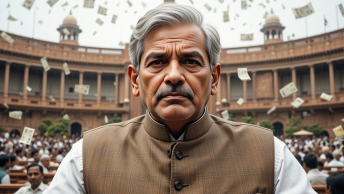One aspect of this week’s atrocity in Mumbai is the questionable role of 24/7 news channels. This report claims that ‘Vying for fresh material, they announced attacks where none had happened, backtracked shoddily, and some even claimed to have “interviewed” a terrorist. They harassed the hostages who had just escaped the gruelling experience, and plied their families with intrusive questions.’ Smallest details of the security operation was telecast, with terrorists inside the hotels receiving this information till the cable connections were cut off. A ‘similar situation in the West would have never seen TV cameras so close to and so revealing of action by security forces’, claims this column.
These comments find echo in the insights of this very interesting new book No Time to Think: The Menace of Media Speed and the 24 Hour News Cycle by Feldman and Rosenberg, which ‘focuses on the insidious and increasing portion of the news media that, due to the dangerously extreme speed at which it is produced, is only half thought out, half true, and lazily repeated anonymous sources interested in selling opinions and wild speculation as news.’
Should this incident force us to rethink 24/7 news channels? There might yet be a silver lining. After all, these channels did expose the sheer incompetence of the government and its agencies in responding to the situation. To quote another columnist, ‘What the television coverage reveals most glaringly, however, is a complete lack of coordination and sense of purpose among the various organs of the state responsible for fighting terror. Television brilliantly captured the scramble and the confusion in the early hours of the crisis. The early pictures of harried officers briefing commandoes hurriedly donning their bullet-proof typified the confusion at the top and while it was great television it did not speak well of a state that should have its terror and media strategy in top gear.’
The jury may still be out, but we do need to evaluate the role of these channels more closely. A negative assessment, however, need not necessarily recommend stringent regulatory control of the sort recommended by the controversial Broadcasting Services Regulation Bill, previously discussed on this blog here, here and here. It might still be possible to explore less draconian legal or self-regulatory measures. For example, its provocative headline notwithstanding, this Outlook column recommends a limited discretion to security agencies to impose a ‘delay’ of three to six hours on the broadcast of anti-terror operations. This may be a sensible, and minimally infringing, restriction on free speech and will be sufficient to deal with at least some of the problems of ‘live’ reporting.









Tarunabh,
The issues of standards and contents of 24/7 news reporting that you have convered in your post, are raised repeatedly with every tragedy that is telecast.
There needs to be a basic code of conduct among news channels which regulates at least:
(a) the repeated telecast of disturbing images,
(b) dramatisation of events by excited news reporters,
(c) immediate telecast of unverified information, that could potentially cause civil disorder, including naming of communities, countries or people in the course of news reporting, especially in the case of terror attacks;
(d) proximity to security forces that could hinder and endanger the efficiency of the operation
I distinctly remember that the coverage of the bomb blasts in Hyderabad last year was particularly insensitive to the dignity of the dead victims. Prominent news channels repeatedly telecast images of victims that were both dehumanising and just plain sick.
I agree that the best way to do this may not be through a legislation. A model of self-regulation may be preferable where news channels agree to a mutually acceptable code, which is adhered to strictly.
Do you have any thoughts on how regulation ought to operate in relation to reporting of terror attacks in the print media?
Dear Swathi, thanks for your comment. Generally, I am not a big fan of any regulation of speech. I have had some doubts since I wrote this post. Perhaps there is a strong case for some self-restraint, but perhaps a lot of good comes out of live broadcast as well. Books like ‘No time to think’ are good for a debate, and give cause to the media to reflect. But I will be hesitant to take the next step of requiring censorship. Perhaps public criticisms of the role of the media, as we saw last week, will suffice. I will be even more sceptical of regulation of print media.
As the divergence between the post and this comment will show, my views on this issue are tentative, with a presumption against regulation.
And here is Barkha Dutt’s defence of the media coverage of the terror strikes.